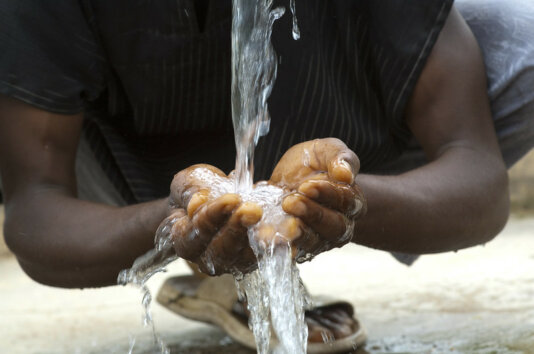- About
- Topics
- Picks
- Audio
- Story
- In-Depth
- Opinion
- News
- Donate
- Signup for our newsletterOur Editors' Best Picks.Send
Read, Debate: Engage.
| topic: | Humanitarian Aid |
|---|---|
| tags: | #well boring, #humanitarian aid, #community co-development, #groundwater, #access to water |
| by: | Nigel Linacre |
Hundreds of millions of people lack access to safe water and hundreds of thousands die each year from water-borne diseases - mostly children. It’s a problem that can be fixed, but to do so we must change the way we think about international development.
International development has been a field in which one party gives something to another. A donor person, organisation or country has more wealth, resources and know-how. A recipient, or beneficiary, is in need of some or all of these things. By and large, this is done via specific projects with a set of deliverables to be accomplished in a short-term time-frame. Experts think about what is required, what can be afforded and how it can be delivered. By and large, the beneficiaries are pleased to receive whatever may be offered, even if it is in some way deficient.
In our first few years as an NGO, it felt important to control the way limited funds were spent, and do what we could to ensure the success of projects. We selected water projects and spent what was necessary to complete them. We were in charge and in-country implementing organisations worked to our brief. It took several years to discover better ways of working.
We can crystallise our learnings in five lessons. Taken together they will enable a radically different approach to international development, what we call “community co-development.”
Our European team knows less than the local team about their fellow citizens. The local team can predict citizen responsiveness and behaviours better. If we think we Europeans understand better, we are usually in error, and if the local team isn’t calling the shots, we are taking ill-advised risks.
Local communities must engage in the development of their community. It’s their life! They’ll need space to describe the problem as they see it, the solution they want and how they can help make it happen. It’s tempting just to install a borewell, or whatever else we deem needed, and often the solution is very much as we would anticipate, but it’s vital to their development that they’re respected and consulted. A written partnership agreement is key.
Engagement enables agreement about their contributions and ongoing responsibilities. Local people may provide locally-available materials and contribute some labour too. The more they participate, the better for their self-esteem and for donors! If it’s a water well, what part will they play in maintenance? What will happen when parts need to be replaced?
Our need to control causes us to often think about projects with specific deliverables. We think less about the means of accomplishing them, as described above, or what happens after the outcomes are produced. Thousands of borewells - the most common form of water solution in rural Africa - have been successfully drilled, poorly maintained, and have ceased to work. The community rarely contributed, they may not have known how to service their well or seek help, and they are back where they started. We call it ‘drill and walk-away’, or ‘DAWA’, and it is a disgrace. In our view, it is essential to have an ongoing partnership.
It costs WellBoring $10 to get safe water to a person, Water Aid says it costs £15 ($20) and UNICEF quotes a figure of $35 for its work in rural Mozambique. $1,000,000 spent with UNICEF would reach around 30,000 people, with Water Aid 50,000 people, and with WellBoring 100,000 people. UNICEF has created great solutions for people, but what about those they could have reached? There are many factors at play. Local input reduces costs, our non-local teams are volunteers, and we stick to simple solutions. Doing good is not good enough.
The water problem looks like a resource problem, but is also a problem of know-how. Even an empowerment problem. Local leaders can find some resource and mobilise their communities. Thankfully, we don’t have to hold onto our intellectual property. Let’s give it all away.
If we replace the parent-child international development model with community co-development, who knows what we might accomplish?
Nigel Linacre is the co-founder and chair of WellBoring.
Image by Arne Hoel / World Bank
